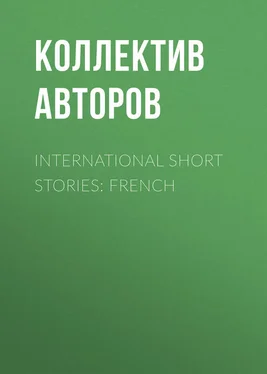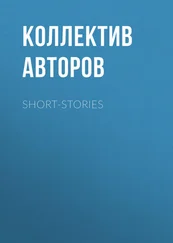Коллектив авторов - International Short Stories - French
Здесь есть возможность читать онлайн «Коллектив авторов - International Short Stories - French» — ознакомительный отрывок электронной книги совершенно бесплатно, а после прочтения отрывка купить полную версию. В некоторых случаях можно слушать аудио, скачать через торрент в формате fb2 и присутствует краткое содержание. Жанр: foreign_antique, foreign_prose, на английском языке. Описание произведения, (предисловие) а так же отзывы посетителей доступны на портале библиотеки ЛибКат.
- Название:International Short Stories: French
- Автор:
- Жанр:
- Год:неизвестен
- ISBN:нет данных
- Рейтинг книги:4 / 5. Голосов: 1
-
Избранное:Добавить в избранное
- Отзывы:
-
Ваша оценка:
- 80
- 1
- 2
- 3
- 4
- 5
International Short Stories: French: краткое содержание, описание и аннотация
Предлагаем к чтению аннотацию, описание, краткое содержание или предисловие (зависит от того, что написал сам автор книги «International Short Stories: French»). Если вы не нашли необходимую информацию о книге — напишите в комментариях, мы постараемся отыскать её.
International Short Stories: French — читать онлайн ознакомительный отрывок
Ниже представлен текст книги, разбитый по страницам. Система сохранения места последней прочитанной страницы, позволяет с удобством читать онлайн бесплатно книгу «International Short Stories: French», без необходимости каждый раз заново искать на чём Вы остановились. Поставьте закладку, и сможете в любой момент перейти на страницу, на которой закончили чтение.
Интервал:
Закладка:
"He might have lived a hundred years longer!" he cried involuntarily when, led in front of his father by some diabolical influence, he contemplated the luminous spark.
Suddenly the intelligent eye closed, and then opened again abruptly, as if assenting. If a voice had cried, "Yes," Don Juan could not have been more startled.
"What is to be done?" he thought
He had the courage to try to close this white eyelid, but his efforts were in vain.
"Shall I crush it out? Perhaps that would be parricide?" he asked himself.
"Yes," said the eye, by means of an ironical wink.
"Ah!" cried Don Juan, "there is sorcery in it!"
He approached the eye to crush it. A large tear rolled down the hollow cheek of the corpse and fell on Belvidéro's hand.
"It is scalding!" he cried, sitting down.
This struggle had exhausted him, as if, like Jacob, he had battled with an angel.
At last he arose, saying: "So long as there is no blood – "
Then, collecting all the courage needed for the cowardly act, he crushed out the eye, pressing it in with the linen without looking at it. A deep moan, startling and terrible, was heard. It was the poor spaniel, who died with a howl.
"Could he have been in the secret?" Don Juan wondered, surveying the faithful animal.
Don Juan was considered a dutiful son. He raised a monument of white marble over his father's tomb, and employed the most prominent artists of the time to carve the figures. He was not altogether at ease until the statue of his father, kneeling before Religion, imposed its enormous weight on the grave, in which he had buried the only regret that had ever touched his heart, and that only in moments of physical depression.
On making an inventory of the immense wealth amassed by the old Orientalist, Don Juan became avaricious. Had he not two human lives in which he should need money? His deep, searching gaze penetrated the principles of social life, and he understood the world all the better because he viewed it across a tomb. He analyzed men and things that he might have done at once with the past, represented by history, with the present, expressed by the law, and with the future revealed by religion. He took soul and matter, threw them into a crucible, and found nothing there, and from that time forth he became Don Juan.
Master of the illusions of life he threw himself – young and beautiful – into life; despising the world, but seizing the world. His happiness could never be of that bourgeois type which is satisfied by boiled beef, by a welcome warming-pan in winter, a lamp at night and new slippers at each quarter. He grasped existence as a monkey seizes a nut, peeling off the coarse shell to enjoy the savory kernel. The poetry and sublime transports of human passion touched no higher than his instep. He never made the mistake of those strong men who, imagining that little Souls believe in the great, venture to exchange noble thoughts of the future for the small coin of our ideas of life. He might, like them, have walked with his feet on earth and his head among the clouds, but he preferred to sit at his ease and sear with his kisses the lips of more than one tender, fresh and sweet woman. Like Death, wherever he passed, he devoured all without scruple, demanding a passionate, Oriental love and easily won pleasure. Loving only woman in women, his soul found its natural trend in irony.
When his inamoratas mounted to the skies in an ecstasy of bliss, Don Juan followed, serious, unreserved, sincere as a German student. But he said "I" while his lady love, in her folly, said "we." He knew admirably how to yield himself to a woman's influence. He was always clever enough to make her believe that he trembled like a college youth who asks his first partner at a ball: "Do you like dancing?" But he could also be terrible when necessary; he could draw his sword and destroy skilled soldiers. There was banter in his simplicity and laughter in his tears, for he could weep as well as any woman who says to her husband: "Give me a carriage or I shall pine to death."
For merchants the world means a bale of goods or a quantity of circulating notes; for most young men it is a woman; for some women it is a man; for certain natures it is society, a set of people, a position, a city; for Don Juan the universe was himself! Noble, fascinating and a model of grace, he fastened his bark to every bank; but he allowed himself to be carried only where he wished to go. The more he saw the more skeptical he became. Probing human nature he soon guessed that courage was rashness; prudence, cowardice; generosity, shrewd calculation; justice, a crime; delicacy, pusillanimity; honesty, policy; and by a singular fatality he perceived that the persons who were really honest, delicate, just, generous, prudent and courageous received no consideration at the hands of their fellows.
"What a cheerless jest!" he cried. "It does not come from a god!"
And then, renouncing a better world, he showed no mark of respect to holy things and regarded the marble saints in the churches merely as works of art. He understood the mechanism of human society, and never offended too much against the current prejudices, for the executioners had more power than he; but he bent the social laws to his will with the grace and wit that are so well displayed in his scene with M. Dimanche. He was, in short, the embodiment of Molière's Don Juan, Goethe's Faust, Byron's Manfred, and Maturin's Melmoth – grand pictures drawn by the greatest geniuses of Europe, and to which neither the harmonies of Mozart nor the lyric strains of Rossini are lacking. Terrible pictures in which the power of evil existing in man is immortalized, and which are repeated from one century to another, whether the type come to parley with mankind by incarnating itself in Mirabeau, or be content to work in silence, like Bonaparte; or to goad on the universe by sarcasm, like the divine Rabelais; or again, to laugh at men instead of insulting things, like Maréchal de Richelieu; or, still better, perhaps, if it mock both men and things, like our most celebrated ambassador.
But the deep genius of Don Juan incorporated in advance all these. He played with everything. His life was a mockery, which embraced men, things, institutions, ideas. As for eternity, he had chatted for half an hour with Pope Julius II., and at the end of the conversation he said, laughing:
"If it were absolutely necessary to choose, I should rather believe in God than in the devil; power combined with goodness has always more possibilities than the spirit of evil."
"Yes; but God wants one to do penance in this world."
"Are you always thinking of your indulgences?" replied Belvidéro. "Well, I have a whole existence in reserve to repent the faults of my first life."
"Oh, if that is your idea of old age," cried the Pope, "you are in danger of being canonized."
"After your elevation to the papacy, one may expect anything."
And then they went to watch the workmen engaged in building the huge basilica consecrated to St. Peter.
"St. Peter is the genius who gave us our double power," said the Pope to Don Juan, "and he deserves this monument. But sometimes at night I fancy that a deluge will pass a sponge over all this, and it will need to be begun over again."
Don Juan and the Pope laughed. They understood each other. A fool would have gone next day to amuse himself with Julius II at Raphael's house or in the delightful Villa Madama; but Belvidéro went to see him officiate in his pontifical capacity, in order to convince himself of his suspicions. Under the influence of wine della Rovere would have been capable of forgetting himself and criticising the Apocalypse.
When Don Juan reached the age of sixty he went to live in Spain. There, in his old age, he married a young and charming Andalusian. But he was intentionally neither a good father nor a good husband. He had observed that we are never so tenderly loved as by the women to whom we scarcely give a thought. Doña Elvira, piously reared by an old aunt in the heart of Andalusia in a castle several leagues from San Lucas, was all devotion and meekness. Don Juan saw that this young girl was a woman to make a long fight with a passion before yielding to it, so he hoped to keep from her any love but his until after his death. It was a serious jest, a game of chess which he had reserved for his old age.
Читать дальшеИнтервал:
Закладка:
Похожие книги на «International Short Stories: French»
Представляем Вашему вниманию похожие книги на «International Short Stories: French» списком для выбора. Мы отобрали схожую по названию и смыслу литературу в надежде предоставить читателям больше вариантов отыскать новые, интересные, ещё непрочитанные произведения.
Обсуждение, отзывы о книге «International Short Stories: French» и просто собственные мнения читателей. Оставьте ваши комментарии, напишите, что Вы думаете о произведении, его смысле или главных героях. Укажите что конкретно понравилось, а что нет, и почему Вы так считаете.

![Коллектив авторов - Best Short Stories [С англо-русским словарем]](/books/26635/kollektiv-avtorov-best-short-stories-s-anglo-thumb.webp)










